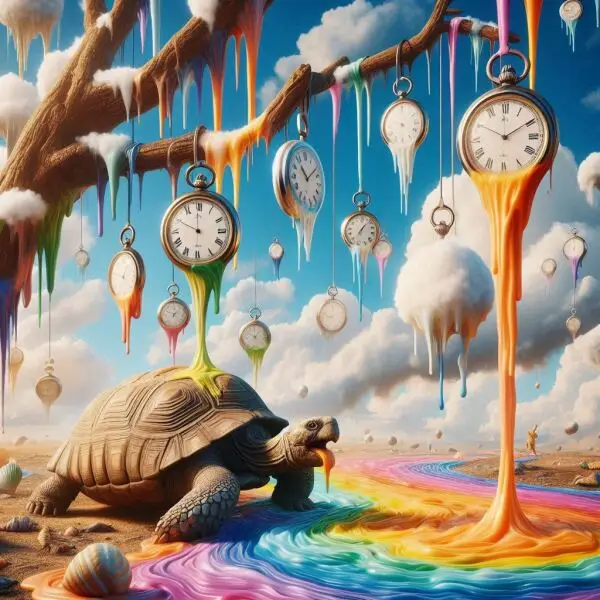Why Does Time Fly as We Age? Discover the Science Behind It
Discover why years fly by as we age: psychology and neuroscience reveal how metabolism, routine, and experiences influence our perception of time....
Table of Contents
- Time and the Infant's Perspective
- The Proportional Theory: A Clock That Accelerates?
- Routines and Memories: Life on Autopilot
- The Enigma of Time: Science and Subjectivity
Follow Patricia Alegsa on Pinterest!
Time and the Infant's Perspective
Since we are little, time feels like a generous friend. Each day shines with new adventures: learning to ride a bike, the first day of school, or discovering a new game. Each experience feels like an eternity.
Do you remember that excitement of waiting for your birthday? For a 10-year-old, a year is nothing less than 10% of their life, a significant piece of the pie. But what happens when we reach 50?
That same year becomes a mere 2%. What a difference! Life feels like a train that speeds up quickly as we hop on board.
Paul Janet, a 19th-century French philosopher, proposed an idea that has captured the attention of many: the proportional theory of time. This concept suggests that as we age, each year feels like a smaller fraction of our total life.
The Proportional Theory: A Clock That Accelerates?
Paul Janet, a 19th-century French philosopher, proposed an idea that has captured the attention of many: the proportional theory of time. This concept suggests that as we age, each year feels like a smaller fraction of our total life.
It's as if time refuses to be our ally! Isn't it a bit frustrating to think that time slips through our fingers like sand?
But, calm down, not everything is so gloomy. There are also other theories that help us understand why we feel that time is speeding up.
Methods for modern life's stress relief
As we move into adulthood, our lives tend to become a series of routines. We wake up, go to work, return home, have dinner, and, poof!, the day is over.
Methods for modern life's stress relief
Routines and Memories: Life on Autopilot
As we move into adulthood, our lives tend to become a series of routines. We wake up, go to work, return home, have dinner, and, poof!, the day is over.
Psychologist Cindy Lustig mentions that this repetitiveness causes our brain to group similar days into a single memory. It's as if time hides behind monotony!
How many days of your life are so similar that you could confuse them? The lack of new experiences makes time seem to fly by. The next time you feel the day slipping away, ask yourself: how many new things have I done today?
The science has also weighed in on this recipe of time. Adrian Bejan, from Duke University, argues that as we age, our ability to process new information decreases.
The Enigma of Time: Science and Subjectivity
The science has also weighed in on this recipe of time. Adrian Bejan, from Duke University, argues that as we age, our ability to process new information decreases.
What a surprise! A young brain captures every detail like a sponge, while an older one feels more like a dusty old book. Moreover, modern physics, with Einstein's theory of relativity, reminds us that time is not a rigid concept.
It's more like a piece of gum that stretches and shrinks according to our circumstances!
So, the next time you feel like time is racing by, remember that it is influenced by your experiences, your routine, and even your body temperature. The perception of time is a fascinating phenomenon that envelops us in an embrace between psychology, neuroscience, and physics.
So, the next time you feel like time is racing by, remember that it is influenced by your experiences, your routine, and even your body temperature. The perception of time is a fascinating phenomenon that envelops us in an embrace between psychology, neuroscience, and physics.
Isn't it incredible that a simple concept like time has so many layers? Life is a journey, and every second counts! Are you ready to make every moment count a little more?
Subscribe to the free weekly horoscope
Aquarius Aries Cancer Capricorn Gemini Leo Libra Pisces Sagittarius Scorpio Taurus Virgo
-
 Improve Your Decision-Making: 5 Minutes of Daily Mindfulness
Improve Your Decision-Making: 5 Minutes of Daily Mindfulness
Improve your decision-making and emotional intelligence at work with just a few minutes of daily mindfulness. Discover its benefits! -
 How to control cholesterol with legumes: the benefits of healthy eating.
How to control cholesterol with legumes: the benefits of healthy eating.
Discover the multiple health benefits of chickpeas, lentils, peas, beans and soybeans! Super nutritious foods you can't miss! -
 Let's respect the elderly: someday you will be old too
Let's respect the elderly: someday you will be old too
On June 15th of each year, World Elder Abuse Awareness Day is celebrated. What can we do to help our elderly? -
 New season of Squid Game! What you need to know
New season of Squid Game! What you need to know
Discover the new season of the series that captivated millions! New adventures, shocking revelations, and the return of key characters await you. -
 Realistic Expectation: How Optimistic Pessimism Transforms Lives
Realistic Expectation: How Optimistic Pessimism Transforms Lives
Don't expect too much. I'm not aiming for something specific, just a general advice: keep your expectations low.
I am Patricia Alegsa
I have been writing horoscope and self-help articles professionally for over 20 years.
Subscribe to the free weekly horoscope
Receive weekly in your email the horoscope and our new articles on love, family, work, dreams and more news. We do NOT send spam.
Astral and numerological analysis
-
 Discover your future, secret personality traits and how to improve in love, business and life in general
Discover your future, secret personality traits and how to improve in love, business and life in general
-
 Online Dream Interpreter: with artificial intelligence
Do you want to know what a dream you had means? Discover the power of understanding your dreams with our advanced online dream interpreter using artificial intelligence that responds to you in seconds.
Online Dream Interpreter: with artificial intelligence
Do you want to know what a dream you had means? Discover the power of understanding your dreams with our advanced online dream interpreter using artificial intelligence that responds to you in seconds.
-
 6 natural remedies to combat the cold and recover faster
6 natural remedies to combat the cold and recover faster
Discover 6 natural remedies to combat the cold and recover faster. Strengthen your immune system and feel better with effective and healthy solutions. -
 Does nighttime anxiety keep you awake? 8 keys to calm your mind and sleep deeply
Does nighttime anxiety keep you awake? 8 keys to calm your mind and sleep deeply
Night-time anxiety: why it spikes when you sleep and 8 key strategies, from mental games to breathing, endorsed by experts from The Times. -
 Discover the 8 Toxic Communication Habits That Sabotage Your Relationships!
Discover the 8 Toxic Communication Habits That Sabotage Your Relationships!
8 toxic communication habits you might be committing unknowingly: discover how they affect your relationships and improve with expert advice. -
 Why is International Albinism Awareness Day celebrated?
Why is International Albinism Awareness Day celebrated?
Every June 13th is not just another day on the calendar. Since 2015, this day has become a beacon of hope, inclusion, and awareness for thousands of people around the world. -
 Alert for Marburg virus, similar to the Ebola virus
Alert for Marburg virus, similar to the Ebola virus
New outbreak of Marburg virus: affecting healthcare workers with high mortality. Find out where and more details about this dangerous pathogen. -
 How to start self-acceptance by focusing on what you love
How to start self-acceptance by focusing on what you love
"The universe guided me on a journey of self-acceptance, but the crucial part was discovering its unique meaning for me. This revelation transformed my life." -
 1,700-year-old Roman sarcophagus discovered at beach bar in Bulgaria
1,700-year-old Roman sarcophagus discovered at beach bar in Bulgaria
A 1,700-year-old Roman sarcophagus discovered at a beach bar in Varna, Bulgaria. Authorities are investigating its mysterious arrival at Radjana Beach. -
 What does it mean to dream of a giant wave?
What does it mean to dream of a giant wave?
Discover the meaning behind your dreams with a giant wave. Are you feeling overwhelmed or ready to face challenges? Find answers in our article. -
 What does it mean to dream of battles?
What does it mean to dream of battles?
Discover the true meaning behind your battle dreams with our article. We explore the interpretation of these dreams in different contexts and help you understand their message. -
 Astrological guide to dealing with a narcissistic boyfriend
Astrological guide to dealing with a narcissistic boyfriend
Find out how the signs react to a relationship with someone narcissistic in this article. -
 How to lose weight with the Mediterranean diet? Experts answer your questions
How to lose weight with the Mediterranean diet? Experts answer your questions
Discover how the Mediterranean diet can help you lose weight and improve your health. -
 How to improve the quality of the sex you have with your partner
How to improve the quality of the sex you have with your partner
Discover the secret to good sex: a key factor that is often overlooked and transforms the quality of your intimate relationships. -
 What does it mean to dream of wagons?
What does it mean to dream of wagons?
Find out what it means to dream of wagons in this fascinating article. Understand how to interpret your dreams and make the best decisions in your life.